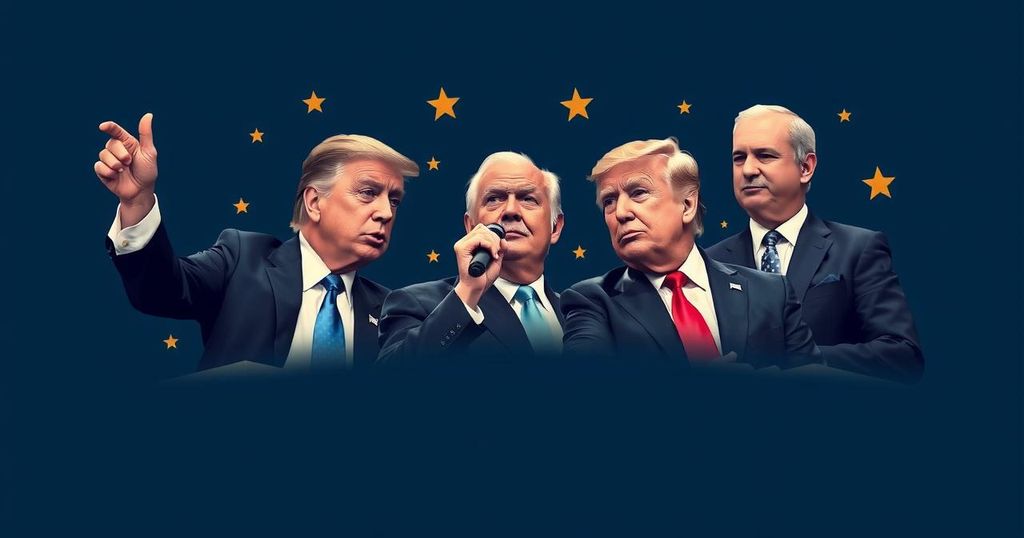Global Leaders React to Donald Trump’s Electoral Victory

Donald Trump’s recent election victory prompts mixed reactions from global leaders, highlighting concerns about international alliances and trade policies. NATO and European officials offer congratulations, though unease persists about America’s commitment to defense. Leaders from Ukraine and Israel express hope for strong ties, while challenges with China loom large, indicating a complex global landscape ahead.
In the aftermath of Donald Trump’s election victory for a second term, global leaders have voiced their mixed reactions, reflecting a cautious optimism paired with apprehension. Trump secured more than the necessary electoral votes, and in his initial victory speech, he proclaimed his intention to prioritize American interests, asserting a vision for a “golden age” for the United States. The world watches closely as Trump’s return raises urgent questions about the future of international alliances and existing global crises. His first presidency alienated numerous allies and incited trade disputes, and leaders fear a similar trajectory may unfold during his renewed term. Trump has hinted at intensifying tariffs against China, and his commitment to resolving conflicts in the Middle East remains unclear, together with controversial pledges regarding the Russia-Ukraine war. NATO Secretary-General Mark Rutte extended his congratulations while addressing concerns regarding the defense of Europe amid decreasing reliance on American military support. Leslie Vinjamuri from Chatham House sarcastically noted the existential worries among Europeans about America’s commitment to NATO during these shifting times. Ukrainian President Volodymyr Zelenskyy also welcomed Trump’s approach, indicating hope for effective peace strategies. International responses varied, with European leaders quickly offering congratulations. British Prime Minister Keir Starmer characterized Trump’s victory as historic, while others like French President Emmanuel Macron extended sentiments of respect and ambition for future relations. However, Trump’s previous protectionist policies, particularly regarding tariffs, raised alarms among European nations. In the Middle East, Israeli Prime Minister Benjamin Netanyahu celebrated Trump’s electoral comeback as a renewal of strong ties between the U.S. and Israel, emphasizing the potential for further collaboration against mutual adversaries. Meanwhile, Hamas issued a cautionary statement regarding the new U.S. administration’s actions toward Palestinian rights in light of ongoing conflicts. As for China, analysts predict enhanced tensions, especially concerning tariffs and the Taiwan dispute, in light of Trump’s past stance on these issues. Allies in the Indo-Pacific, such as Japan and South Korea, have expressed readiness to work closely with Trump, highlighting concerns regarding regional security. As leaders around the globe assess the implications of Trump’s reelection, a shared urgency prevails: the landscape of international relations is poised for significant upheaval, with many nations bracing themselves for potential challenges ahead.
Donald Trump’s reelection as U.S. President signals a potentially transformative period for global diplomacy and international relations. His first term was marked by significant shifts in policy that often disregarded traditional alliances, prompting mixed responses from countries worldwide. This article discusses the immediate reactions of global leaders following his recent victory, highlighting their hopes and fears regarding future engagements in economic, military, and diplomatic arenas.
In conclusion, Donald Trump’s reelection prompts urgent reassessments of international relations as world leaders react with a combination of hope and apprehension. The implications for NATO, the Middle East, and U.S.-China relations illustrate a landscape fraught with potential challenges. Allies are left to navigate a future overshadowed by Trump’s unpredictable policy directions while seeking to stabilize their interests amid shifting global dynamics.
Original Source: www.pbs.org








